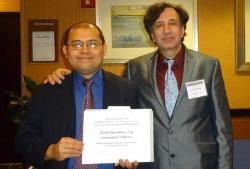This section of the SUNY Empire website is no longer being updated.
View current SUNY Empire Stories.
November 18, 2015
Emmanuel Tabones ‘13, Professor Justin Giordano Win Best Overall Paper

The results of a study on the minimum wage by Justin Giordano, a professor of business and law at SUNY Empire State College, and Emmanuel Tabones ‘13, was awarded Best Overall Paper by the Northeastern Business and Economics Association at its 42nd annual meeting.
Giordano and Tabones presented, “Minimum Wages and Low-wage Workers: Correlational Evidence from El Centro, California (Imperial County), in Comparison with Select U.S. and State (California - specific) Statistical Data” at the association’s annual conference, held Friday, Nov. 6, at the City University of New York’s York College campus.
The two were completely unaware their paper was under consideration for the award, and were informed together with all other conference attendees, during lunch, sometime after they made their presentation.
“It was all a complete surprise,” said Tabones, who earned a Bachelor of Arts in Business, Management and Economics, with a concentration in economics, from the college. “Professor Giordano and I thought that everything was going to be routine. We were going to come in Friday morning, give our 15-20 minute presentation, have lunch, network with fellow researchers, maybe reconnect with old colleagues and make new friends. I certainly did not expect that our little research study was going to garner the Overall Best Paper award.”
In their award-winning paper, Giordano and Tabones argue that a minimum wage puts less-competitive workers at greater risk for job loss, especially when economic conditions result in a lower demand for labor.
Their presentation began with the question: “What would happen if we got rid of the minimum wage?”
“There has been much talk, at all levels and in various forums, about the minimum wage issue and its impact on its intended beneficiaries, businesses that employ them, as well society and the economy as a whole,” said Giordano. “Consequently, Manny and I decided to take as an objective and unbiased look as feasible at the issue in question. We decided to utilize data from the U.S. Bureau of Labor Statistics as our primary source, based on the assumption that this data is presumed to be objective and neutral in terms of political or ideological bent.”
Tabones explained that another important purpose of the study was to demonstrate that good evidence exists as to effects of changes in minimum wages on employment by selecting an area of the country with a weak labor market and identifying and interpreting relevant employment patterns.
Giordano added, “We looked at a very particular area, Imperial County, California, and focused in particular on its county seat of El Centro, which seemed to represent quite well, at the micro level, the essence of what we wanted to examine. Currently, we are thinking about expanding this study to see if this type of research has a broad application elsewhere.”